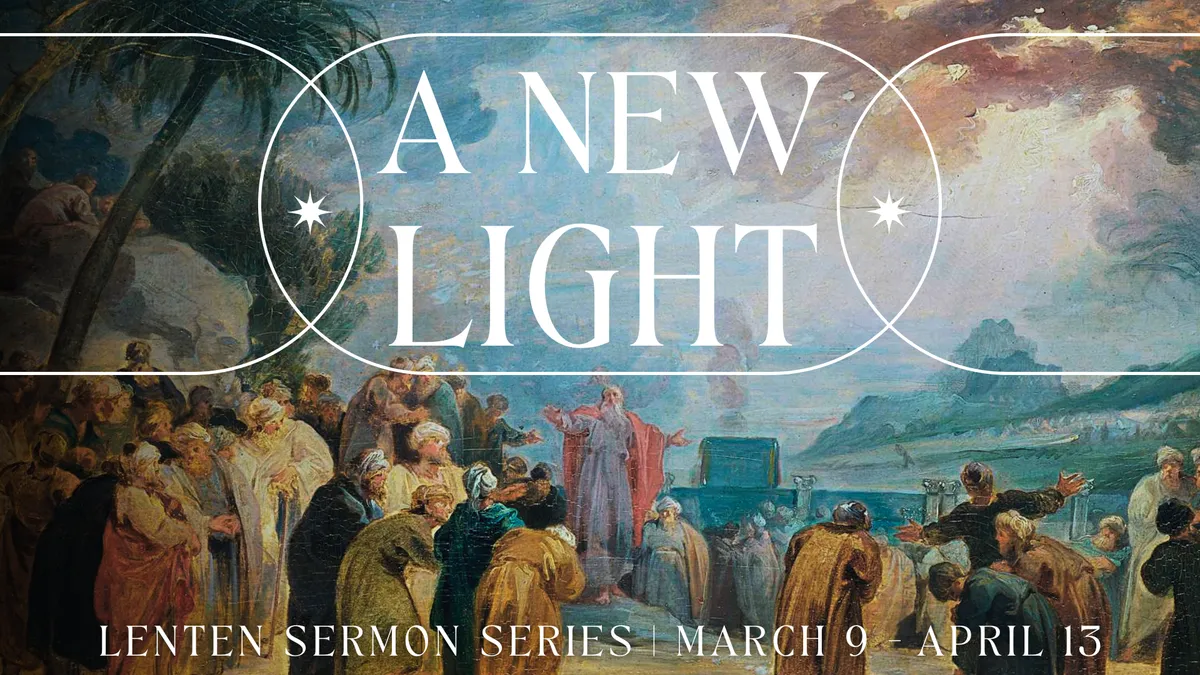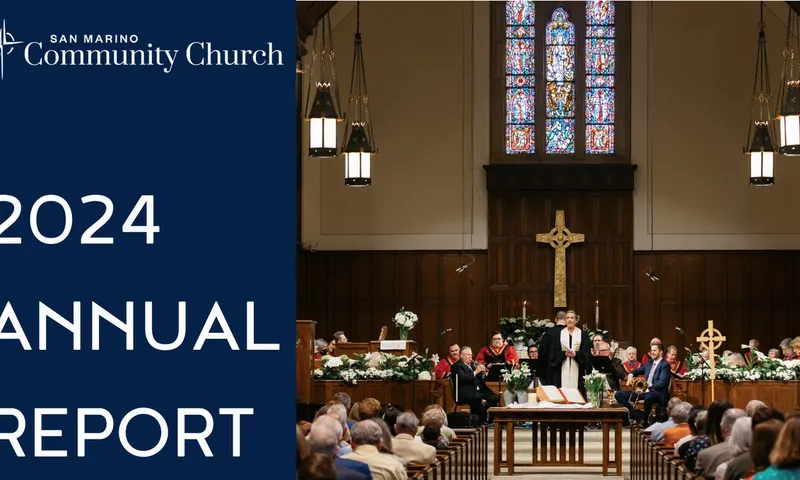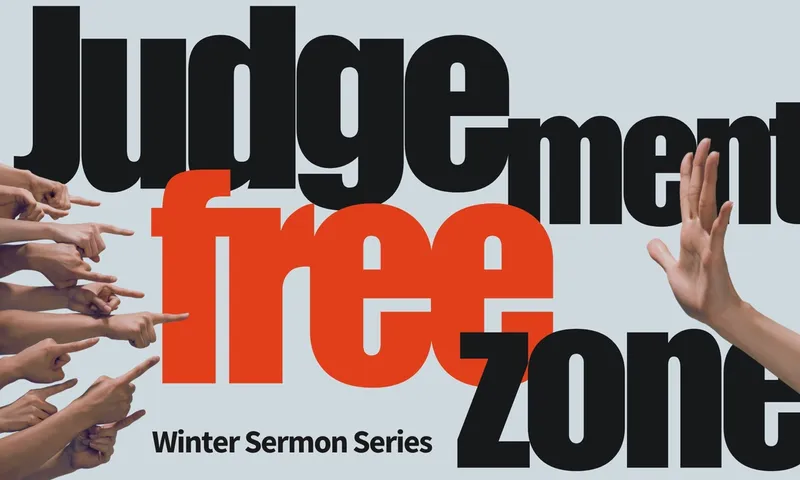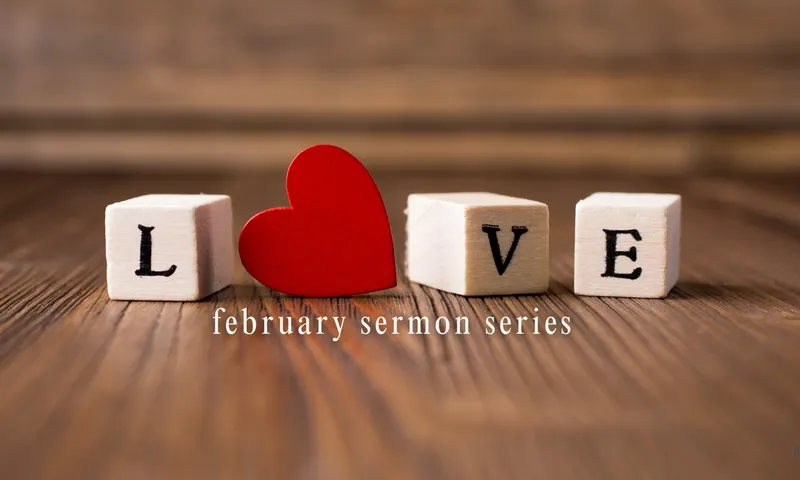A New Light: Small Group Resources

Look here for all your 'Go Deeper' Resources for our Lenten Sermon Series: A New Light

A digital version of the A New Light Study Guide can be viewed or downloaded by clicking here.
Below you will find the 'Go Deeper' Resources, which will be updated at the start of each week.
Week 1 | March 9 - 15, 2025
Sermon: Forever and a Day | Rev. Jessica Vaughan Lower
Scripture: Hebrews 13:8-16
Our Book of Order, which is the other part of our constitution in the PC(USA) in addition to the Book of Confessions, states in F-2.01-02 that our creeds and confessions “declares to its members and to the world who and what [the church] is, what it believes, and what it resolves to do. These statements identify the church as a community of people known by its convictions as well as by its actions. They guide the church in its study and interpretation of the Scriptures; they summarize the essence of Reformed Christian tradition; they direct the church in maintaining sound doctrines; they equip the church for its work of proclamation. They serve to strengthen personal commitment and the life and witness of the community of believers. The creeds and confessions of this church arose in response to particular circumstances within the history of God’s people. They claim the truth of the Gospel at those points where their authors perceived that truth to be at risk. They are the result of prayer, thought, and experience within a living tradition. They appeal to the universal truth of the Gospel while expressing that truth within the social and cultural assumptions of their time. They affirm a common faith tradition, while also from time to time standing in tension with each other. These confessional statements are subordinate standards in the church, subject to the authority of Jesus Christ, the Word of God, as the Scriptures bear witness to him. While confessional standards are subordinate to the Scriptures, they are, nonetheless, standards. They are not lightly drawn up or subscribed to, nor may they be ignored or dismissed.”
Questions to consider:
- How familiar are you with our confessional statements? What is the purpose of confessional statements? What role do they play in our reformed faith tradition?
- Consider this essay excerpt from “The Confession of 1967” in Book of Confessions: Study Edition, Revised (2017). Why might it be a valuable practice for us to treat the confessional statements as products of their time but also instructive for our current reality? What does it say about our tradition that we allow for statements that stand “in tension with each other?” What does this allow for?
`“Since 1967, the social influence of the mainline church has come to seem less impressive. From one direction, declining numbers and budgets have focused these churches on questions of institutional survival. From another, profound shifts in American society have challenged values long associated with the Christian tradition. Presbyterians find themselves thinking anew about the church’s relationship to culture and the dangers of accommodating the gospel to [other] values… C67 does have a helpful word for the church in our time. While we may see clearly how it reflected a particular moment in time because of our relative closeness in both culture and history, we also recognize that the church still must make progress on all these tasks: on issues of race—when almost all congregations are racially homogenous; on issues of peace-making—when divestment from makers of the tools of war is seen by some too radical for the church; on issues of poverty—as income and wealth gaps soar; and on issues of sexual relations—as sexual harassment and violence remain far too common within the church” (p. 366).
Week 2 | March 16 - 22, 2025
Sermon: How Can We Glorify God Each Day? | Rev. Dr. Tom Tewell
Scripture: Psalm 73: 24-26
Consider this excerpt from “The Westminster Confession of Faith” in Book of Confessions: Study Edition, Revised (2017) alongside this excerpt from the Directory for Worship in our Book of Order:
Westminster Confession (6.112): “The light of nature showeth that there is a God, who hath lordship and sovereignty over all; is good, and doeth good unto all; and is therefore to be feared, loved, praised, called upon, trusted in, and served with all the heart, and with all the soul, and with all the might…”
Book of Order (W-5.01): “We respond to God’s grace both in public worship and service and in personal acts of devotion and discipleship. Personal life and public worship are deeply connected. Christian life springs from Christian worship, where we find our identity as believers and discover our calling as disciples. Christian life flows back into worship as we present to God the prayers of our hearts and the offering of our lives…”
The Westminster Confession is part one of the Westminster Standards which includes the Shorter Catechism and was composed by the Westminster Assembly in England in 1647. This was a critical moment for Protestantism in England as the Puritans and the Presbyterians argued for their respective methods of church governance. The Directory for Worship is informed by scripture as well as the creeds and confessions and is what guides our PC(USA) church today in our preparations for worship and understanding what it means to worship God.
Questions to consider:
- How does the Directory for Worship build on or clarify the message of the Westminster Confession for our modern ears? How do both texts treat God’s sovreignty, or supreme power/authority, over our whole lives?
- Thinking back to the Shorter Catechism, how do these texts shine a light on what it might mean to “glorify” God? How do they encourage us to make God our center?
Week 3 | March 23 - 29, 2025
Scripture: Acts 19:21-41
Sermon: A Holy Disruption: Unmasking Idolatries in Church & Culture | Rev. Beth Putney
This week, we’re going to take a look at the full “brief” statement of faith, in part to help prepare your group for our week 4 invitation to write your own statement of faith but also because it is the most recently composed confession of the PC(USA). My suggestion is that you engage with this section after you’ve finished the printed study guide for the week. Invite members of your group to read a section (there are six) and pay attention to a few things: 1. Structure, 2. Allusions to scripture that are incorporated into what we say we believe and how we exist as Christians in the world, and 3. A phrase or two that really stands out to you.
You might need some quiet time after the group reading to make notes or think, but spend some time with your group talking through each of these things. At the end of your time, decide how you want to approach next week’s statement of faith writing. Do you want everyone to write their own before the next meeting and share with the group next week? Do you want to try your hand at composing a group statement during your next meeting? Or would you prefer to use next week’s gathering to write individual statements (and have people around to bounce ideas off of)? I’ve included some guidelines and helpful hints in next week’s entry in the study guide to get you started regardless of the path you choose!
THE STATEMENT
11.1
1 In life and in death we belong to God.
2 Through the grace of our Lord Jesus Christ,
3 the love of God,
4 and the communion of the Holy Spirit,
5 we trust in the one triune God, the Holy One of Israel,
6 whom alone we worship and serve.
11.2
7 We trust in Jesus Christ,
8 fully human, fully God.
9 Jesus proclaimed the reign of God:
10 preaching good news to the poor
11 and release to the captives,
12 teaching by word and deed
13 and blessing the children,
14 healing the sick
15 and binding up the brokenhearted,
16 eating with outcasts,
17 forgiving sinners,
18 and calling all to repent and believe the gospel.
19 Unjustly condemned for blasphemy and sedition,
20 Jesus was crucified,
21 suffering the depths of human pain
22 and giving his life for the sins of the world.
23 God raised this Jesus from the dead,
24 vindicating his sinless life,
25 breaking the power of sin and evil,
26 delivering us from death to life eternal.
11.3
27 We trust in God,
28 whom Jesus called Abba, Father.
29 In sovereign love God created the world good
30 and makes everyone equally in God’s image,
31 male and female, of every race and people,
32 to live as one community.
33 But we rebel against God; we hide from our Creator.
34 Ignoring God’s commandments.
35 we violate the image of God in others and ourselves,
36 accept lies as truth,
37 exploit neighbor and nature,
38 and threaten death to the planet entrusted to our care.
39 We deserve God’s condemnation.
40 Yet God acts with justice and mercy to redeem creation.
41 In everlasting love,
42 the God of Abraham and Sarah chose a covenant people
43 to bless all families of the earth.
44 Hearing their cry,
45 God delivered the children of Israel
46 from the house of bondage.
47 Loving us still,
48 God makes us heirs with Christ of the covenant.
49 Like a mother who will not forsake her nursing child,
50 like a father who runs to welcome the prodigal home,
51 God is faithful still.
11.4
52 We trust in God the Holy Spirit
53 everywhere the giver and renewer of life.
54 The Spirit justifies us by grace through faith,
55 sets us free to accept ourselves and to love God and neighbor,
56 and binds us together with all believers
57 in the one body of Christ, the Church.
58 The same Spirit
59 who inspired the prophets and apostles
60 rules our faith and life in Christ through Scripture,
61 engages us through the Word proclaimed,
62 claims us in the waters of baptism,
63 feeds us with the bread of life and the cup of salvation,
64 and calls women and men to all ministries of the Church.
65 In a broken and fearful world
66 the Spirit gives us courage
67 to pray without ceasing,
68 to witness among all peoples to Christ as Lord and Savior,
69 to unmask idolatries in Church and culture,
70 to hear the voices of peoples long silenced,
71 and to work with others for justice, freedom, and peace.
72 In gratitude to God, empowered by the Spirit,
73 we strive to serve Christ in our daily tasks
74 and to live holy and joyful lives,
75 even as we watch for God’s new heaven and new earth,
76 praying, “Come, Lord Jesus!”
11.5
77 With believers in every time and place,
78 we rejoice that nothing in life or in death
79 can separate us from the love of God in Christ Jesus our Lord.
11.6
80 Glory be to the Father, and to the Son, and to the Holy Spirit. Amen.
Week 4 | Break
Week 5 | April 6-12 , 2025
Scripture: John 17: 20-23
Sermon: A New Light: Unified, not Uniform | Rev. Jessica Vaughan Lower
The following is an excerpt from the letter that accompanied the Confession of Belhar when it was presented to the 221st General Assembly in 2014 for adoption into the Book of Confessions of the PC(USA): “The Presbyterian Church (U.S.A) is again facing a critical time in its history. We are rent apart by division and schism, we have yet to directly confront and confess the racism that has been a significant force in our own history, and we have shown a failure of resolve to make courageous stands for justice. We believe that the Confession of Belhar, a profound statement on unity, reconciliation, and justice in the church, comes to us as a word from God for this particular time and place for the PC(USA)...
“As Jesus launched his mission, the poor, the sinners, the wounded, the oppressed, the blind, and the tax collectors gladly welcomed him. It was those whose privilege was threatened by transformation who rejected Jesus… We are being called to launch this mission again in our place and time. While the Confession of Belhar arose from the struggle of South African Christians to give witness to the Gospel amidst the injustice of apartheid, we are also being called to give witness in the face of injustice here among us in the U.S.A. We see that injustice in the faces of thousands of First Nation peoples who still live in dire poverty on reservations; in young African American men who are incarcerated disproportionate to their percentage of the population; in the ‘legal limbo’ status of immigrants… The winds of polarizations blow strong and threaten the body politic as never before.”
- While this letter does not have confessional status, its purpose is to contextualize the adoption of the Confession of Belhar in the landscape of 2014 U.S. 11 years later, how do you see this kind of polarization playing out in our context and how might the message of unity, reconciliation, and justice in the Confession be a call to action in our own time?
- How has (or hasn’t) the Church taken steps to directly confront this kind of polarization and barrier to unity?
Week 6 | April 13-19 , 2025
Scripture: 1 Peter 2:17
Sermon: A New Light: The Faith and the Politic | Rev. Jessica Vaughan Lower
Consider these quotes from Reinhold Niebuhr and Dietrich Bonhoeffer, writing in 1932 and 1937 respectively, about what it means for us to engage the world as individuals in society. What is each theologian’s posture and tone? Where do they align? How are they in tension with each other? How do these theologians shape the way you hear the Theological Declaration of Barmen? What can we learn from both of them as we try to engage the public realm in our own time?
“As individuals, men believe that they ought to love and serve each other and establish justice between each other. As racial, economic and national groups they take for themselves, whatever their power can command… Power sacrifices justice to peace within the community and destroys peace between communities. It is not true that only kings make war. The common members of any national community, while sentimentally desiring peace, nevertheless indulge impulses of envy, jealousy, pride, bigotry, and greed which make for conflict between communities.” —Reinhold Niebuhr, Moral Man and Immoral Society (156, 161)
“Let the Christian remain in the world, not because of the good gifts of creation, nor because of his responsibility for the course of the world, but for the sake of the body of the incarnate Christ and for the sake of the church.Let him remain in the world to engage in frontal assault on it, and let him live the life of his secular calling in order to show himself as a stranger in this world all the more. But that is only possible if we are visible members of the church.…The other worldliness of the Christian life art, Luther concluded, to be manifested in the very midst of the world, in the Christian community and in its daily life. Hence the Christians task is to live out that life in terms of his secular calling. That is the way to die unto the world. The value of the secular calling for the Christian is that it provides an opportunity of living the Christian life with the support of God's grace, and of engaging more vigorously in the assaults on the world and everything that it stands for.” —Dietrich Bonhoeffer, The Cost of Discipleship (264-65)
Explore Related Resources
- Resources

Annual Report 2024
You can view or download our 2024 Annual Report here.
- Resources

Judgement Free Zone: Small Group Resources
Look here for all your 'Go Deeper' Resources in our Judgement Free Zone Sermon Series
- Resources

Love Sermon Series
Find resources for our February 2025 Sermon Series here